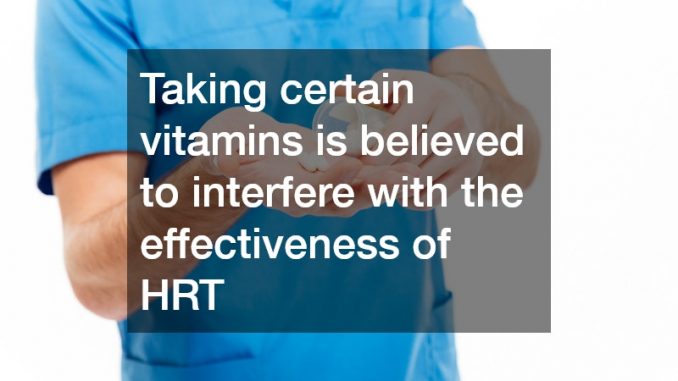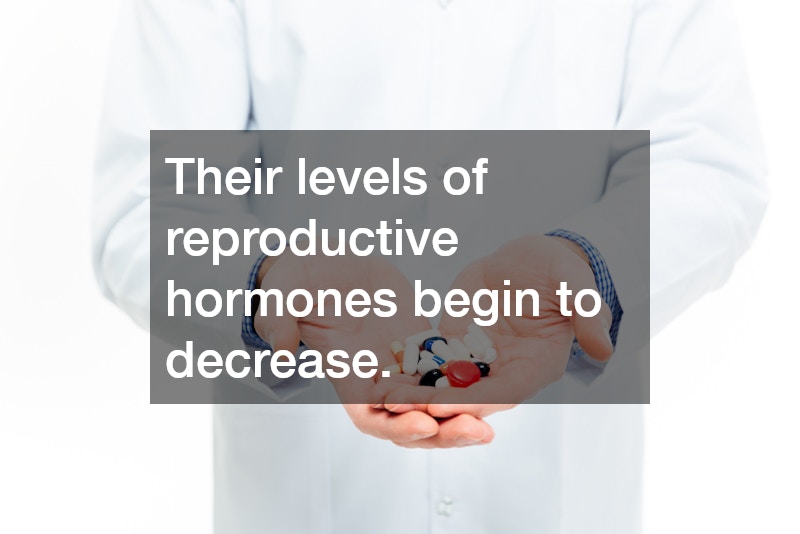

As women reach the end of their childbearing years, their levels of reproductive hormones begin to decrease. This hormone change typically causes symptoms like night sweats and vaginal dryness. According to Healthline, it can also cause fatigue, mood swings, and a decrease in calcium, which can place women at risk for broken bones. According to VeryWell Health, some women also find success when using hormone therapy for anxiety symptoms.
If a woman asks their doctor about the symptoms, the doctor may prescribe hormone replacement therapy. According to WebMD, hormone replacement therapy (HRT) can decrease night sweats, reduce vaginal dryness, and improve sleep. The same website reports most women see signs HRT is working in less than three months.
Taking certain vitamins is believed to interfere with the effectiveness of HRT, and women should ask their doctors which vitamins to take. According to the Cleveland Clinic, the best hormonal supplements include calcium and vitamin D (for bone health.) Once a woman begins using HRT, her hormone levels should be monitored. If a woman stops using HRT, she will experience side effects of stopping HRT – which will include a return of night sweats, vaginal dryness, and mood swings.

Everybody wants to get older, but nobody wants to look older. This a basic fact of life. Aging is particularly hard on women. We tend to experience a much higher level of aging symptoms than men do. While men maintain their fertility and don’t undergo the dramatic changes of a process like menopause, women find that their bodies and their minds undergo a massive change over a short period of time. There are ways you can combat these changes in your everyday life, through diet and exercise. But while these might have some positive mental effects, they don’t change much about the physical side effects of menopause. These physical effects can really change how women view themselves, triggering other problems like depression. Luckily, while you can’t change some of the more permanent parts of menopause, you can make yourself look younger with a medical professional’s help. Anti aging clinics can do a lot to reverse the aging process — which also makes people feel a lot younger. These anti aging clinics are often known as hormone replacement clinics, as hormone replacement therapy is one of the main treatments that makes women look and feel younger. Where hormone replacements were once seen as drastic, we now know how to go about the therapy in a way that produces natural effects. Let’s look into hormone replacement therapy, and why so many people love it.
Are You A Candidate For Hormone Replacement Therapy?
Let’s look into whether or not you’re a candidate for hormone replacement therapy. Like any medical treatment, it isn’t for everyone. But for many, the positives benefits are enough to make people at least give it a try — and usually, they’re so glad they did. Candidates for hormone replacement therapy are women going through menopause who’ve experienced an excess of negative side effects. This can include hot flashes, weight gain, vaginal dryness, and much more. The negative mental effects of menopause can also be a factor for women deciding whether or not to undergo hormone replacement therapy. Menopause can cause a roller coaster of mood swings, which in turn can trigger long-term mental illness in women with a predisposition for illnesses like depression and anxiety. Many women feel much older after going through menopause, and simply want to confront that. Some of the best candidates for hormone replacement therapy are women who’ve undergone premature menopause — that is, menopause before age 40.
What Are The Benefits Of Hormone Replacement Therapy?
There are several different benefits to hormone replacement therapy. It can alleviate the symptoms of menopause, like hot flashes. However, there is one benefit to hormone replacement therapy that many people don’t even take into consideration. If taken quickly enough, hormone replacement therapy can actually help prevent or stop the progression of osteoporosis. Osteoporosis is a degenerative condition that results in bone loss. For many, the benefits of hormone replacement in stopping or preventing osteoporosis is enough of a reason to take advantage of it. But if this does sound like the right treatment for you, there are a couple of different types of hormone replacement therapies to take advantage of.
Which Type Of Hormone Replacement Therapy Should I Choose?
There are two main types of hormone replacement therapies of which people can take advantage. In the past, people often chose systemic hormone replacements. This involve systemic estrogen, taking in a patch, gel, pill, cream, or spray form. It is the most effective treatment for hot flashes and night sweats. It can also treat dryness, itchiness, burning, and discomfort during intercourse. The other main option is low-dose vaginal products. These products come in cream, tablet, or ring form. They minimize absorption into the body, while treating vaginal or urinary tract issues. They don’t help with hot flashes, night sweats, or protection against osteoporosis.
By choosing the right hormone replacement therapy, you can have the best possible life after menopause. It’s just a matter of deciding whether or not this treatment is for you.

Leave a Reply
You must be logged in to post a comment.